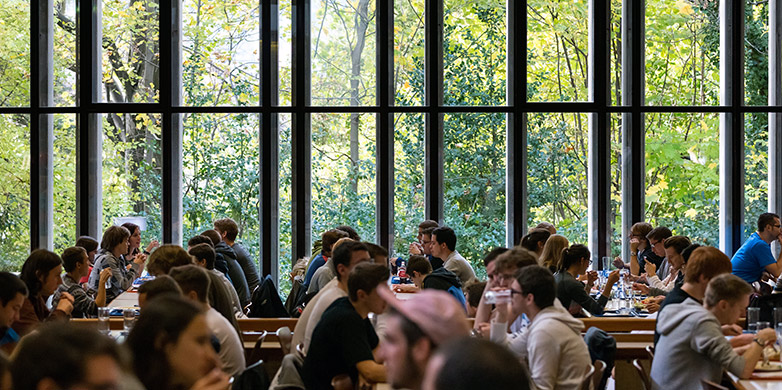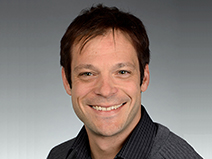Sustainable Catering on the Campus
We usually envision sustainable development in the halls of academia as research and teaching in environmental sciences, engineering and architecture. What we barely think of, however, is food – and food on campus even less. This is what our initiative aims to change.
Although the food system accounts for roughly one third of our civilization’s gross environmental impact, catering currently takes a backseat in sustainable development efforts at higher education institutions. [1] However, our catering services feed thousands of staff, faculty members and students daily. And as higher education institutions aspire to pioneer solutions for the world’s grand challenges, building sustainable food systems is one of them. So why not develop solutions right here, on campus, by engaging students in project-based learning, by helping them to implement and evaluate sustainable campus catering together with the service providers? [1]
Engaging the stakeholders
For us at ETH Zurich the question of whether catering on campus is sustainable and what can be done to make it more sustainable called for a multi-sectoral approach. Thus, in summer 2013, based on a mandate from the ETH Zurich catering commission, and in close cooperation with ETH Sustainability and the World Food System Center, we started to take a critical look. The pivotal point of our activities became the catering commission itself. It governs catering on campus by including all relevant stakeholders: faculty, private caterers, student associations, and ETH administrative and operative units. This ensured broad and strong support for our initiative from the beginning, which in turn created a promising opportunity: to initiate a transformation of the campus food system by creating a “living lab for sustainable campus catering”.
Building the lab together
Our living lab [2] was founded on real-world experiments [3], and for these, ETH Sustainability’s seed sustainability project platform became the ideal hub. The platform facilitates impact-oriented master and bachelor theses on real world challenges together with industry partners. It enabled us to team up with the caterer, SV Group, and temporarily turn two canteens into one experimental and one control canteen. By doing so, thousands of staff and faculty members as well as students became part of the lab. Supervised by the chairs of Consumer Behaviour and Ecological Systems Design, three interdisciplinary teams of students carried out their research. Between 2014 and 2016, these teams developed and tested interventions aimed at cutting greenhouse gas emissions, reducing food waste, and creating healthy and environmentally friendly diets.
Findings: what can we do?
Concern that there is little room for working on sustainability in campus catering is widespread and justified. For campus catering, upmarket-strategies are beyond reach: price elasticity is low since the majority of customers are students on a tight budget. Tweaking menu plans is the most effective lever for making a canteen more sustainable; but it is high-risk, as customer satisfaction and sales figures are directly linked. Scientific results from three project phases now clearly demonstrate that the environmental impact of menus can in fact be reduced without jeopardizing sales figures. There is no trade-off between a lowered carbon footprint of meals and customer satisfaction, as Vivianne Visschers and Michael Siegrist showed. [4] Rather, alternative sustainable meal choices can and must be developed and promoted, particularly since raising awareness of environmental-friendly behaviour alone is not effective.
Interdisciplinary research in the living-lab was essential for determining the impact of interventions. For example, in the second phase of the project, the option of ordering a small portion for a reduced price proved psychologically effective: this intervention reduced leftovers after sale – a key factor of the total food waste produced by catering operations – by over 20%. Had we relied exclusively on consumer survey data and sales figures, we would have dismissed the intervention as having virtually no impact. Only the integration of detailed survey data and analyses of the actual waste generated during the intervention phase led to the insight that offering small plates reduced waste.
From the living lab to an embedded programme
Our project became very visible and elicited various calls to action from internal and external stakeholders. Hence, the next logical step is to define a binding “ETH sustainable catering programme” with a commitment to reducing greenhouse gas emissions and further developing sustainability standards. On 26 April, the ETH Zurich catering commission approved a draft concept; it includes incentive mechanisms that promote the living lab as the instrument of choice for achieving the programme’s future objectives. A detailed programme document and an implementation plan will be developed by autumn 2016. Since the caterers at ETH Zurich are private companies, we hope that the innovations and best practices generated by our programme will also extend beyond the campus.
Further information
[1] Lozano, R. et al. (2015) A review of commitment and implementation of sustainable development in higher education: results from a worldwide survey. Journal of Cleaner Production, 108, p. 1-18.
[2] Schneidewind, U. (2014) Urbane Reallabore – ein Blick in die aktuelle Forschungswerkstatt. pnd|online III|2014.
[3] Gross, M.; Hoffmann-Riem, H. and Krohn, W. (2005) Realexperimente – Ökologische Gestaltungsprozesse in der Wissensgesellschaft. transcript Verlag, Bielefeld.
[4] Visschers, V. H.M. and Siegrist, M. (2015) Does better for the environment mean less tasty? Offering more climate-friendly meals is good for the environment and customer satisfaction. Appetite, 95, p. 475-483.
See also this blog post on the topic (in German).



